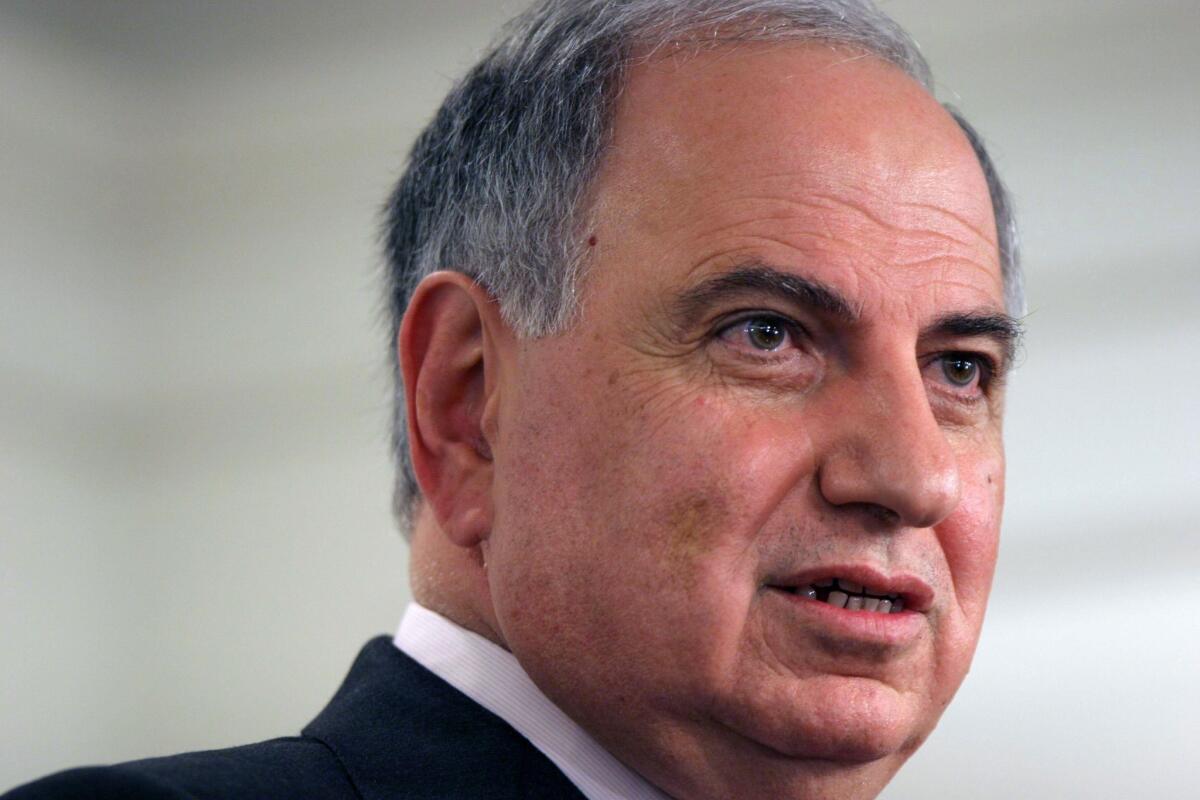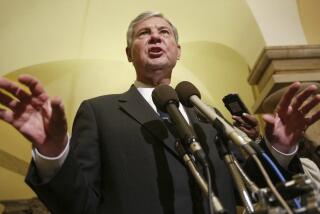Ahmad Chalabi dies at 71; former Iraqi exile was leading advocate of 2003 war

After the 9/11 terrorist attacks, Ahmad Chalabi, shown in 2005, and his London-based political exile faction funneled intelligence to Bush administration neoconservatives eager to oust Iraqi leader Saddam Hussein. The reports — later discredited — alleged that Hussein had weapons of mass destruction.
Ahmad Chalabi, the Iraqi exile whose false claims that Saddam Hussein had weapons of mass destruction and ties to Al Qaeda helped convince the George W. Bush administration to invade Iraq to execute regime change, was found dead at his Baghdad home on Tuesday of an apparent heart attack. He was 71.
A controversial but indisputably influential political force in Washington and London as well as his homeland, Chalabi never achieved his ambition to lead post-war Iraq and left a legacy replete with missteps.
The U.S.-educated mathematician-turned-political-lobbyist founded the Iraqi National Congress with other exiles in 1992 and six years later persuaded Congress to pass the Iraqi Liberation Act that declared the Clinton administration’s aim of toppling Hussein.
After the Sept. 11, 2001, terrorist attacks, Chalabi and his London-based political exile faction funneled intelligence from Iraqi exiles and opposition figures to Bush administration neoconservatives eager to oust Hussein. The reports — some emanating from a confidential informant code-named Curveball — alleged that the Iraqi leader had hidden stores of chemical weapons and nerve gases that Al Qaeda-linked forces were ready to deploy against Western adversaries.
It was that intelligence — later discredited — that prompted the March 2003 invasion of Iraq by U.S.-led forces and the occupation of the volatile country that was soon consumed by sectarian violence and chaos.
Chalabi was remembered by Iraqi leaders on Tuesday as an ardent advocate of democracy and brave mediator in his homeland’s internal conflicts, as well as a tainted political figure dogged through his lifetime by accusations of corruption and self-dealing.
“The deceased had a large role in fighting the dictatorship and initiating the building of a democratic Iraq,” said Iraqi parliament head Salim Jabouri, describing Chalabi as someone “who dedicated his life to the service of the country.”
Iraqi President Fuad Massoum echoed the sentiment, proclaiming in a statement that Chalabi’s death was “a great loss” for Iraq.
But Chalabi was a divisive figure, and critics took to social media to accuse him of having steered Iraq into disaster.
“The traitor has died, the one who sold his country twice,” a Twitter user named Ali Al-Dafiri posted. “Once to the American who spit him out, and then to the Iranians who ignored him.”
He was the target of an assassination attempt by a suicide bomber in 2008 that killed six of his bodyguards and intensified the heavy security cordon that surrounded him for the rest of his life.
Although Chalabi never attained the high office he sought after Hussein was driven from Baghdad in April 2003 and eventually captured, tried and executed, he remained active in Iraqi politics to the end. He served in the inaugural U.S.-appointed Iraqi Governing Council in 2003 and was later tasked with heading the De-Baathification Committee charged with rooting out Hussein loyalists. The latter role stirred resentment among Iraq’s Sunni minority that helped feed the sectarian strife still consuming the country.
Chalabi played the role of political bon vivant, hosting scholarly and artistic salons at his lavish Baghdad home, incongruously constructed in the style of American architect Frank Lloyd Wright. At the time of his death, he was serving as head of the parliamentary finance committee, an ironic role in view of the corruption allegations that stained his business reputation.
In 1992, Chalabi was sentenced in absentia by a Jordanian military court to 22 years in jail on 31 charges of embezzlement, theft, misuse of depositor funds and currency speculation after a two-year investigation into the workings of Petra Bank, which Chalabi had founded in 1977. He fled Jordan before the court ruling and never served the sentence or paid the millions in restitution ordered by the court. Jordan’s King Abdullah II eventually pardoned Chalabi when he was serving as a deputy prime minister of Iraq.
Chalabi was also the target of a U.S.-led corruption probe only a year after American forces airlifted him into Baghdad, anticipating a role for him in the post-Hussein leadership. The investigation and brief detention of Chalabi in 2004 was spurred by suspicion that he was providing U.S. intelligence to Iran.
No such evidence was uncovered, and what Chalabi viewed as betrayal by Washington led him to join forces with radical Shiite cleric Moqtada Sadr and his Iranian-allied Mahdi Army, which remains a powerful and at times disruptive force in Iraq. Chalabi also supported the 2011 Arab Spring uprising in Bahrain against the Sunni monarchy that continues to roil the Gulf kingdom.
Ahmad Abdul Hadi Chalabi was born in the Iraqi capital on Oct. 30, 1944, and attended an elite Jesuit high school where he met other privileged youths who would later play roles in the country’s governance. His fellow students included former Prime Minister Ayad Allawi and Oil Minister Adel Abdul Mahdi.
Chalabi fled Iraq with his family for exile in Britain at 14, after a military coup deposed the monarchy in 1958. He moved to the United States for his studies, earning a bachelor’s degree from MIT in 1965 and a doctorate in mathematics at the University of Chicago four years later.
He followed his wealthy forebears in a banking career until the Petra Bank scandal, then turned his attention to politics and the U.S.-backed quest to depose Hussein, who had seized power in Baghdad in 1979 after a coup by the Baath Party.
Chalabi is survived by his wife, Leila Osseiran, the daughter of a prominent Lebanese politician, and their four children.
Twitter: @cjwilliamslat
Special correspondent Nabih Bulos contributed to this report.
More to Read
Start your day right
Sign up for Essential California for news, features and recommendations from the L.A. Times and beyond in your inbox six days a week.
You may occasionally receive promotional content from the Los Angeles Times.







